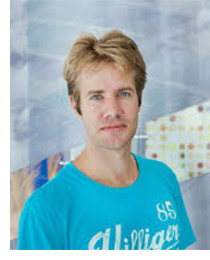Using the Interplay Between Photoprotection and Photosynthesis for New Crop Improvement Strategies
Wanne Kromdijk, University of Illinois at Urbana-Champaign
 Abstract: Global food demand is expected to increase substantially over the coming decades. Productivity increases through conventional breeding of most important food crops have slowed down over the last decade, and global climate change is putting additional pressures on food production. Additionally, crop yields are increasingly sensitive to water availability and atmospheric humidity, and irrigation during crop cultivation is depleting global groundwater supplies at an alarming rate. Thus, new crop improvement and crop husbandry strategies are needed urgently to improve crop productivity and water use efficiency.
Abstract: Global food demand is expected to increase substantially over the coming decades. Productivity increases through conventional breeding of most important food crops have slowed down over the last decade, and global climate change is putting additional pressures on food production. Additionally, crop yields are increasingly sensitive to water availability and atmospheric humidity, and irrigation during crop cultivation is depleting global groundwater supplies at an alarming rate. Thus, new crop improvement and crop husbandry strategies are needed urgently to improve crop productivity and water use efficiency.
In my work I am looking for new crop improvement and crop husbandry strategies by studying the physiology of photosynthesis and its interactions with environmental drivers. In this talk I will present research looking at the interplay between photosynthesis and photo-protection. When sunlight exceeds the capacity of photosynthesis to utilize the energy to assimilate carbon, several photo-protective mechanisms are induced to safely dissipate the excess energy as heat. This dynamic system protects the photosynthetic antenna complexes against severe photo-inhibition and bleaching, but can come at the expense of lower efficiency of photosynthesis. Our results with transgenic manipulation of photo-protection highlight several new strategies to improve photosynthetic light use efficiency, biomass productivity and transpiration efficiency.
Bio: Growing up in an area of The Netherlands with an abundance of glasshouses, I became interested in crop production at an early age. I obtained my BSc and MSc in Plant Sciences at Wageningen University (NL) and PhD in Plant Sciences at the University of Cambridge (UK). I subsequently worked as a research scientist in greenhouse horticulture at Wageningen for three years, followed by five years as a postdoc on the Realizing Increased Photosynthetic Efficiency project at the Carl Woese Institute for Genomic Biology (UIUC). My research takes place at the nexus of basic understanding of plant function and applications to improve sustainability and food security and employs a range of techniques from ecophysiology, mathematical modelling, biotechnology and genetic engineering. In September 2018, I will start as a group leader at the Department of Plant Sciences at the University of Cambridge (UK).
